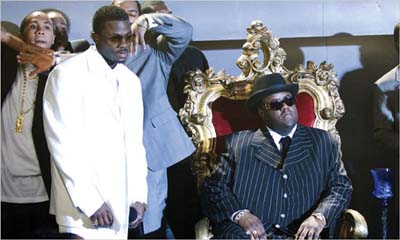The Notorious B.I.G.’s Life Chronicled in New Film
Story by Broadside Staff Writer Ross Bonaime. Photo courtesy of Phil Caruso/Fox Searchlight Pictures.
 Notorious is noteworthy for being a musical biopic to a modern day musical legend. Usually, films of this style discuss a musician who has been around for years and show the impact and importance of the artist’s music over decades such as Taylor Hackford’s Ray, James Mangold’s Walk the Line or even Todd Haynes’ 2007 ensemble masterpiece I’m Not There. What is so unique about Notorious is that it is about a musician who is considered legendary and genre-defining after releasing only one album before his death, showing the utter importance of B.I.G. to hip-hop.
Notorious is noteworthy for being a musical biopic to a modern day musical legend. Usually, films of this style discuss a musician who has been around for years and show the impact and importance of the artist’s music over decades such as Taylor Hackford’s Ray, James Mangold’s Walk the Line or even Todd Haynes’ 2007 ensemble masterpiece I’m Not There. What is so unique about Notorious is that it is about a musician who is considered legendary and genre-defining after releasing only one album before his death, showing the utter importance of B.I.G. to hip-hop.
Notorious follows Christopher Wallace from the streets of Brooklyn to the world-wide phenomenon that would become known as the Notorious B.I.G. We first see Wallace as a child, played by the late rapper’s son, being told he is “too fat, too black and too ugly” to be as successful as the musicians he glamorizes in hip-hop magazines. As he grows older, he begins to sell crack to live the lifestyle he has always dreamed of. While hustling, he shows a profound ability to create incredible rhymes, making his friends insist that he leave the lifestyle that is destined to send him to jail once again. With a new goal for his life, Biggie, played by newcomer Jamal Woolard, meets with up-and-coming producer Sean “Puff Daddy” Combs, portrayed by Friday Night Lights’ Derek Luke, which leads to his legendary success, friendship and betrayal with Tupac Shakur and ultimately, his untimely death.
The infamous rivalry between Tupac and Biggie has been well-documented and does not take up the majority of this film. Therefore, director George Tillman, Jr. focuses on Wallace’s rise to fame. We see the relationships and people who make him who he is. Relationships with Lil’ Kim and wife Faith Evans, played by Naturi Naughton and Antonique Smith, respectively, and the most important woman in his life, his mother, played by Angela Bassett, show Wallace’s rise to the top as well as friendships with Combs and others.
B.I.G. never made any attempt to hide his love for his mother and Tillman’s film recreates their strong bond well when Woolard and Bassett play opposite each other.
Woolard already looks like Wallace, yet he studied several months at Juilliard to get his sound down perfectly and he sells every line. Bassett looks like a younger Voletta Wallace and shows equal parts compassion and tough love for her son in the movie, trying to set him down the right path, no matter how he strays.
While it is a welcome change to see a piece of media about the Notorious B.I.G., the film could have easily shown more of the relationship between Shakur and the famous East Coast rapper. With the exception of a few party scenes and random encounters, it is never truly acknowledged just how close the two were. Also, while the entire East Coast-West Coast rap rivalry does factor into that, more could have been shown to indicate the importance of this feud in hip-hop music history. But of course, as with any film about a musician, the greatest aspect of Notorious is the music.
Every song is used in context and gives deeper meaning to the lyrics. We see a musical prodigy creating art in a way that few before him had. We see the cogs of hip-hop turning and changing the music into something that it had never been before and an artist who changed everything. Notorious shows what B.I.G. did for rap and makes current hip-hop chart-toppers look like jokes. Notorious fantastically illustrates that while Wallace’s career was short, he was nonetheless revolutionary and that his music and legend still truly do have a life after death.
